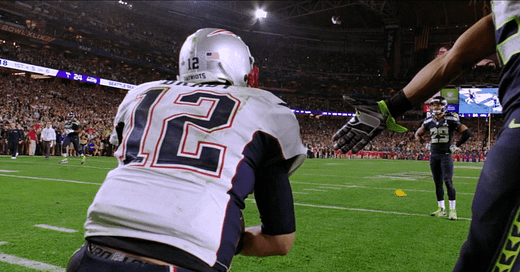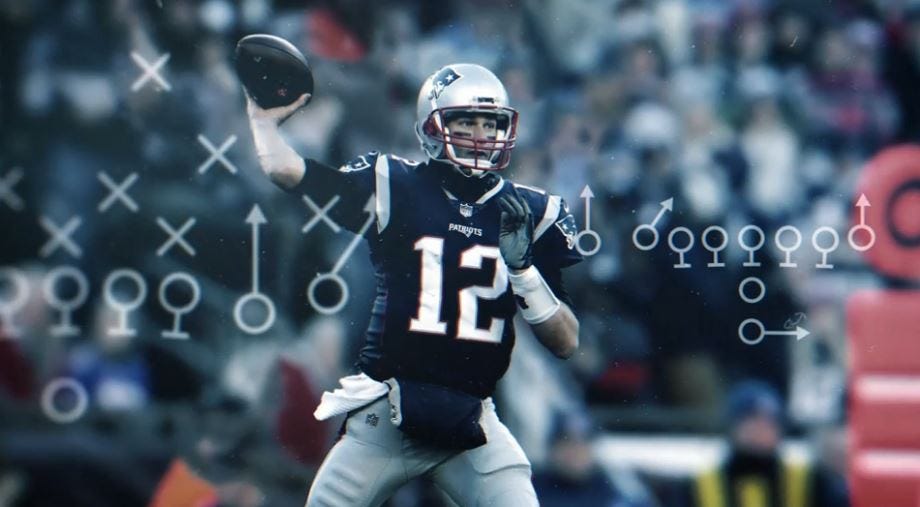When Tom Brady Hit Rock Bottom
Before the Patriots could climb back to the top, they had to hit rock bottom.
Hi friends! We're publishing the newsletter a day early both this week due to the holidays. But starting in the new year, we'll be back to our regularly scheduled Friday programming, as we continue to examine every new episode of Man in the Arena to better understand what each of Tom Brady's Super Bowl seasons can teach us about the nature of competition—and of life. Enjoy, forward to a friend, and Happy Holidays from all of us at ROS!
From the outside looking in, it seemed like the end came during week four of the 2014 NFL season—the end of the Patriots’ dynasty and Tom Brady’s career, that is. They played a road game on Monday night against the Chiefs and got slaughtered on national TV, 41-14. Brady threw two interceptions, and after the second, he was benched in favor of rookie quarterback Jimmy Garoppolo.
On the newest episode of our series Man in the Arena, out now on ESPN+, there’s a deluge of clips that immediately follow the loss. They feature pretty much every talking head on sports television, and they all pretty much say the same thing: The Patriots are no good, Brady is part of the problem, and you can just about guarantee that the New England dynasty is finished.
As Vince Wilfork said in the episode, the Patriots viewed the noise as a challenge: “How mentally tough can you be?”
The Patriots flew back to Boston late that night, and Brady didn’t go home. He drove straight to the facility, starting to dissect what went wrong. “We’re not going to let one loss become two,” he said. Or, in the infamous words of Bill Belichick, it was onto Cincinnati (the Pats played the Bengals the next week).
That mantra stayed with the team the rest of the year. “Whoever we played, it was onto…the next team,” explained Brady. They won the next game. Then another one. “One win, and you get a little more confident,” Brady said. “Like, ‘Wow, that was a good style of play.’ And then that one win leads to two. Two leads to three. Three leads to four. You start winning four games in a row in the NFL, and you’re onto something.”
What they were onto was another Super Bowl victory, this time in a thriller against the Seattle Seahawks. It’s clear, though, that the season flipped with that week four dud against the Chiefs; the Patriots had to hit bottom before they could climb to the top. Reliving the Patriots dynasty each week with the series, I’ve been reminded of how epic each of the Patriots’ victories felt in the moment, how they always felt like they meant more than the years when, say, a team like the Broncos or Seahawks or Colts won it. Perhaps that’s because the Patriots felt like they were playing for history. Or perhaps it’s because it was as if each of the wins felt representative for something larger, some sort of eternal truth. In 2014, that truth was the importance of resilience.
There’s a moment about halfway through this week’s episode when Brady says, “We always felt like we had an advantage when things weren’t perfect.” It seems like a simple statement at its face, but in that one sentence, Brady captures the magic of those Patriots teams as beautifully as anybody ever has. The Patriots weren’t the most talented team ever, but they were the best at responding to adversity. They lost 41-14, and they were on to Cincinnati. They fell short 10 seasons in a row, and they kept fighting. They gave up a miracle play, and Malcolm Butler was there to create a new miracle. Maybe that does make these Patriots the greatest of all time.
“There’s a lot of perspective you gain from things not going your way,” said Brady. “They allow you to really see who’s closest to you. They allow you to see deeper inside yourself. You have to find areas of growth that maybe you didn’t know that you were capable of. And when things get hard, you’ve got to figure out: Who can I count on the most?”
Who? The type of people challenging themselves every day with a maxim of, “How mentally tough can you be?” is a pretty good place to start.
Now Streaming: Man In The Arena Podcast
In addition to the docuseries, we’re also producing a Man in the Arena podcast, in which Gotham Chopra explores two decades of Brady’s career through the eyes of the fans and haters, those inside and outside of the arena. Each episode grapples with the ways in which Brady has altered our understanding of sports. In episode six, Gotham explores the Gordian knot that is the nature of time. How can a Hail Mary seem to travel through the air in slow motion, while an entire season flies by before you know it? And what can “football time” tell us about time itself?
So Let It Be Written...
Why Did the WTA Risk Everything for Peng Shuai?
By Jon Wertheim • Sports Illustrated
A third of the World Tennis Association’s money comes from China, but, as its CEO tells SI, “Some things are more important than money.”
Signed, Sealed, Delivered: How the Gift of a 1963 Baseball Connected Two Oxnard Men
By Steve Henson • The Los Angeles Times
A lovely ode to a lost era, friendship, and four hall of fame signatures.
Lincoln Riley has USC Trojans starting to believe in themselves again
By Paolo Uggetti • ESPN
Riding shotgun with the Trojans new coach during his first few weeks on the job.
'Twas the Night Before Christmas...
You can have Rudolph and Frosty and the Grinch. For my money, the greatest Christmas story there came over 100 years ago when sports brought a second of lightness to the dark of war.
At the outset of World War I in 1914, most people thought the war would be over quickly. Parents actually encouraged their sons to hurry to the fronts so they wouldn’t miss the action. There was a saying at those times: “Over by Christmas.” That’s what everybody expected to happen. Only, of course, that’s not what happened. Both sides dug trenches. The slog of World War One had begun.
On Christmas Eve, weeks of unrelenting rain turned to snow. The men settled in for a night of muted celebrations when a British troop saw a dim yellow light coming from the German trench. The British scrambled. They thought an attack was imminent. But then another light came. And another. Soon, the British could see what they were: candles, illuminating Christmas trees. The Germans sang Silent Night, and the Brits responded with “The First Noel.”
In the morning, one German soldier stepped out from over the trench, and a British counterpart met him in the middle of “No-Man’s-Land.” They shook hands. Soon, all the troops were celebrating Christmas together…but they didn’t read from the Bible. They said no prayers. No soldier delivered a poignant sermon. Somebody had a soccer ball, and soon everybody was playing together. Where they didn’t have a ball, they made one from loose clothing. At some points on the trench, games included over 100 men. At others, games were organized, including one featuring the Royal Army Medical Corps against the 133rd Saxons. The Germans beat the English 3-2.
Kurt Zehmisch, a German lieutenant, went back to his side of the trench and that night, wrote in his diary. “A lively game began,” he described. “How fantastically wonderful and strange...that thanks to soccer and Christmas, the feast of love, deadly enemies briefly came together as friends.”
It's hard to say it better than that. Sports are a universal language, a way to heal. They can literally be a peacemaker. So on this holiday, we remember the spirit of that night. May we all be united by the things we love in this new year. Merry Christmas.
Sam Greenwood / Getty Images
A Picture Is Worth a Thousand Words
When we talk about what we mean when we say “Religion of Sports” we wax poetic about rituals and traditions and miracles and holy wars. Or we could just show you this picture, which just about says it all.
Old School
‘Twas the Fight Before Christmas (1999)
By Rick Reilly • Sports Illustrated
I shared this story last December, but it’s such a great one that I think it’s OK if we share it again. Billy Miske was a boxer whose body was failing him. His kidneys were about to quit, and he was running low on cash. Knowing he wasn’t going to have enough money to buy his children Christmas presents, and knowing it might be his family’s last Christmas together, Miske signed up for one final bout. He was too sick to train. It didn’t matter. He won by knockout.
Last Word
“I think what I recognized in 2014 was, ‘Man, this is really hard.’”
– Tom Brady








